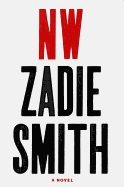
In NW, her third novel since White Teeth, Zadie Smith uses lean stream-of-consciousness narration tethered to taut skeins of dialogue to portray a trio of characters who have migrated varying distances from their shared roots in a northwest London housing estate. Smith's characters are ethnically diverse, but the subject of her novel is more existential than multicultural--all three principals struggle to inhabit their adult, free-will professional and personal lives with conviction after emerging from childhoods confined by cultural norms, familial expectations, geographical allegiance and immigrant anxiety.
Leah Hanwell and Natalie De Angelis have been friends from age four to their present mid-30s; Felix Cooper is a contemporary who lives in their periphery and whose noble story bridges their sections. The novel illuminates contemporary cultural frictions by investigating the progress of Leah's and Natalie's relationships and careers. Felix's quest takes the reader across London and depicts the fraught pressures of modern manhood.
Readers seeking a conventional narrative may be frustrated by NW's challenging stream-of-consciousness segues, hodgepodge typography, dearth of dialogue tags and fungible structure, but only about 10% of the text requires actual puzzling out.
By limiting most of her authorial prose to character thought and by delivering gobs of visceral dialogue, Smith virtually embeds the reader alongside her broad cast of NW residents. One does not read NW so much as eavesdrop on it. Smith has moved beyond the somewhat hyper comic tone of White Teeth and the descriptive indulgences of On Beauty to write her most empathetic, humanly vulnerable novel to date. --Holloway McCandless, blogger at Litagogo: A Guide to Free Literary Podcasts

